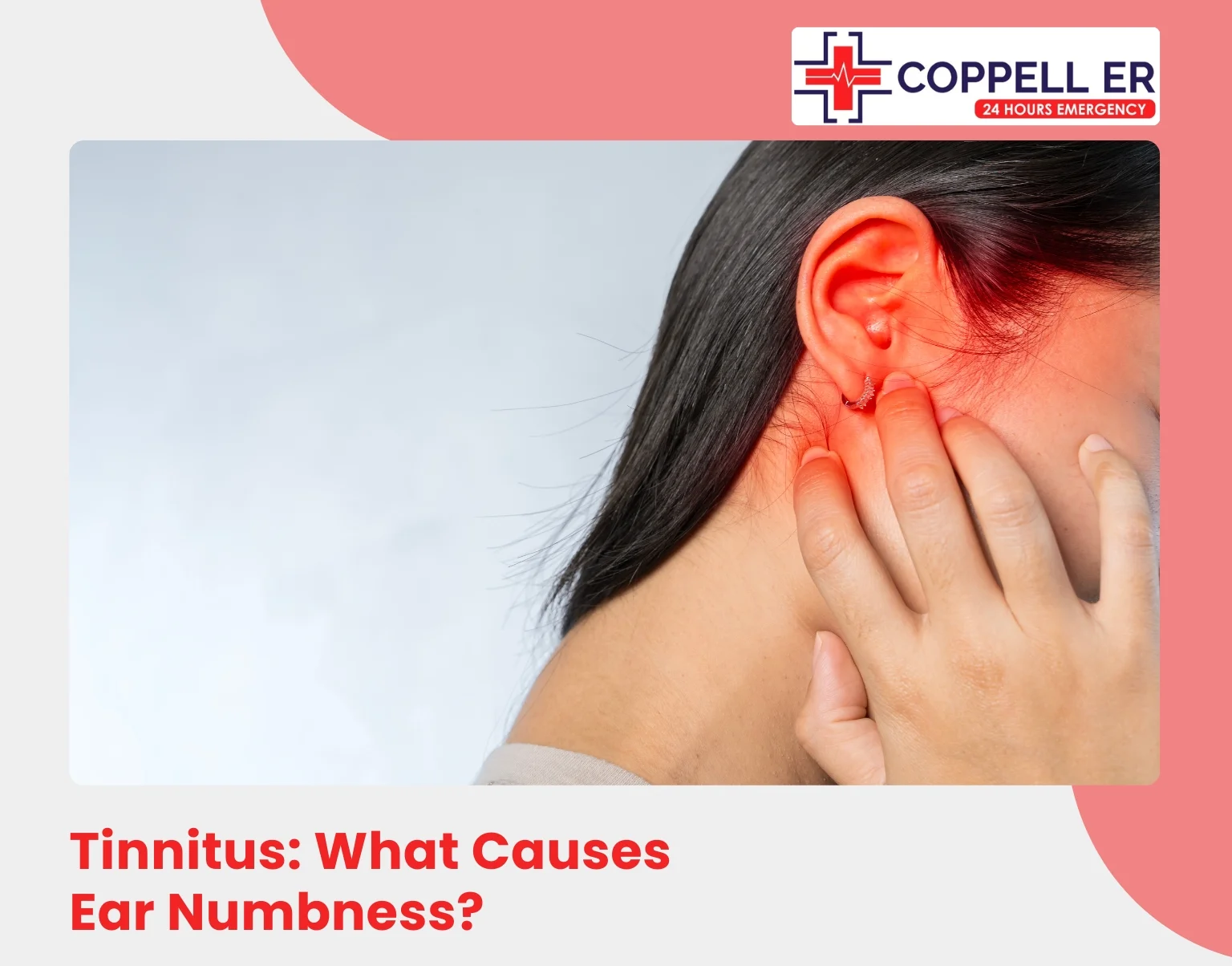Tinnitus occurs when your brain picks up sounds like ringing, hissing, or humming that are not there. According to the American Tinnitus Association, over 50 million Americans experience it at some point. It may be short-term or chronic and paired with unusual symptoms like numbness in or near the ear.
Can Tinnitus Cause Ear Numbness?

Ear numbness isn’t a classic tinnitus symptom, but some people report it. It might feel like tingling, pressure, or a “dead” sensation in the ear. While tinnitus itself doesn’t directly cause numbness, the two can be linked through underlying issues.
Let’s explore the top causes.
What are the Common Causes of Tinnitus and Ear Numbness?
- Earwax Buildup
Too much earwax can block your ear canal, leading to ringing and a numb or heavy feeling. Cleaning your ears safely, preferably with a doctor’s help, might fix it. - Hearing Loss
Age-related or noise-induced hearing loss often triggers tinnitus. As your hearing fades, your brain might “fill the gap” with phantom sounds. Numbness could come from nerve changes tied to this. - Ear Infections or Inflammation
An infection in your middle or inner ear can irritate nerves, causing ringing and numbness. Swelling might also mess with blood flow, adding to the problem. - Nerve Issues
Conditions like auditory nerve damage or facial nerve problems (like Bell’s palsy) can tie tinnitus to numbness. If the nerves misfire, you might feel both symptoms together. - TMJ (Jaw Problems)
Your jaw joint, called the temporomandibular joint (TMJ), sits close to your ear. TMJ disorders can press on nerves, leading to tinnitus and a numb or tight feeling in the area. - Blood Flow Changes
High blood pressure or poor circulation can affect your ears. Pulsatile tinnitus (hearing your heartbeat) sometimes comes with a numb or full sensation. - Stress or Anxiety
Stress doesn’t cause tinnitus directly, but it can make it worse. Tense muscles or clenched jaws might also create that numb feeling near your ears.
Other Symptoms Associated with Tinnitus
Besides ear ringing, tinnitus may also cause:
- Stress due to fear of tinnitus
- Ear pain
- Anxiety
- Depression
- Difficulty sleeping
- Difficulty concentrating
- Decreased hearing
What are the types of Tinnitus?
Tinnitus can be categorized into several types based on its characteristics and causes. Here are the main types:
-
Subjective Tinnitus:
- The most common type, heard only by the individual.
- Often linked to issues in the auditory system, such as hearing loss, ear infections, or exposure to loud noise.
- May be associated with stress, anxiety, or medications.
-
Objective Tinnitus:
- Rarely, where both the individual and the doctor can hear the sound during the examination.
- Typically caused by physical issues like blood vessel problems (e.g., turbulent blood flow), muscle contractions, or bone conditions in the ear.
- Examples include pulsatile tinnitus (rhythmic sounds synced with heartbeat) or myoclonus (muscle spasms).
-
Pulsatile Tinnitus:
- A subtype of objective tinnitus, characterized by rhythmic or pulsing sounds, often in time with the heartbeat.
- Usually related to vascular issues, such as high blood pressure, blood vessel abnormalities, or tumors affecting blood flow near the ear.
-
Neurological Tinnitus:
- Caused by disorders affecting the nervous system, particularly the auditory nerves.
- Often associated with conditions like Meniere’s disease or vestibular schwannoma (acoustic neuroma).
-
Somatic Tinnitus:
- Linked to physical movements or sensations, such as muscle tension or issues in the head, neck, or jaw.
- May be triggered or worsened by actions like clenching the jaw, turning the head, or applying pressure to certain areas.
-
Mixed Tinnitus:
- A combination of subjective and somatic or objective tinnitus, where multiple factors contribute to the perception of sound.
Key Vitamin Deficiencies Linked to Tinnitus
Vitamin Deficiency |
Effects on Tinnitus |
Causes of Deficiency |
Sources/Food |
| Vitamin B12 | Irritates and hampers nerve function in the ear | Pernicious anemia, malabsorption, poor diet, excessive coffee, smoking | Meat, fish, dairy, eggs, milk; lab-produced |
| Vitamin D | Causes poor bone health, including internal ear bones | Not specified in detail | Dairy, fortified cereals, mushrooms, synthesized via sunlight |
| Zinc | May lead to auditory issues, including tinnitus | Malnutrition, certain medical conditions | Nuts, seeds, whole grains, legumes |
| Magnesium | Potentially exacerbates tinnitus, especially noise-induced | Stress, poor diet, and certain medications | Leafy greens, nuts, and whole grains |
Groups Most Affected by Tinnitus
Here is a list of groups most affected by tinnitus:
- Older adults
- People exposed to loud noises:
- Construction workers
- Musicians
- Military personnel
- Frequent concert-goers
- Individuals with certain medical conditions:
- High blood pressure
- Diabetes
- Cardiovascular disease
- Thyroid problems
- Those with mental health issues:
- Anxiety
- Depression
- High stress levels
When Should You See a Doctor?

If your tinnitus or ear numbness sticks around for more than a few days or comes with dizziness, hearing loss, or pain, it’s time to check in with a doctor. ENT (ear, nose, and throat) specialists are commonly involved in tinnitus cases.
They examine your ears, test your hearing, and address structural issues or infections that might be causing the ringing. Audiologists conduct detailed hearing tests to determine if tinnitus is linked to hearing loss.
How is Tinnitus Diagnosed?
Tinnitus is diagnosed through:
- Medical History: Questions about the sound, duration, triggers, and related symptoms (e.g., hearing loss, dizziness).
- Physical Exam: Checking ears, head, and neck for wax, infections, or structural issues.
- Hearing Tests: Audiometry to assess hearing loss, pitch/loudness matching, and middle ear function.
- Imaging: MRI/CT scans for suspected tumors or vascular issues (if needed).
- Blood Tests: To check for deficiencies (e.g., B12, zinc) or systemic conditions.
Diagnosis often involves primary care doctors, ENTs, and audiologists, with neurologists or others consulted for complex cases.
How to Manage Tinnitus and Ear Numbness?

- Sound Therapy: Background noise (like a fan or white noise app) can mask tinnitus.
- Relaxation: Stress makes it worse, so try deep breathing or yoga.
- Ear Checkup: See an ENT (ear, nose, throat) specialist to rule out wax or infections.
- Healthy Habits: Cut back on caffeine, stay hydrated, and protect your ears from loud noises.
FAQs
What is tinnitus?
Tinnitus is hearing sounds like ringing or humming without an external source, affecting over 50 million Americans.
Does tinnitus cause ear numbness?
Tinnitus doesn’t directly cause numbness, but both can stem from shared causes, like nerve issues.
What causes tinnitus and ear numbness?
Earwax buildup, hearing loss, ear infections, nerve damage, TMJ disorders, poor blood flow, or stress.
What are the types of tinnitus?
Subjective (heard only by you), objective (heard by a doctor), pulsatile (rhythmic), neurological, somatic, or mixed.
What other symptoms come with tinnitus?
Ear pain, stress, anxiety, depression, sleep issues, trouble focusing, or hearing loss.
Are vitamin deficiencies linked to tinnitus?
Yes: Vitamin B12, Vitamin D, zinc, or magnesium deficiencies may worsen tinnitus.
Who’s most affected by tinnitus?
Older adults, those exposed to loud noises, or those with high blood pressure, diabetes, or stress.
How is tinnitus diagnosed?
Via medical history, physical exam, hearing tests, imaging (MRI/CT), or blood tests.




